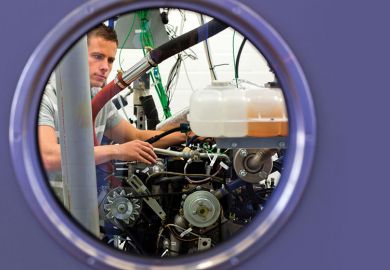Sydney’s top universities are marshalling their resources to accomplish some Herculean tasks as Australia assumes an increasingly interdisciplinary approach oriented around goals rather than specialties.
Sydney Nano, one of eight multidisciplinary centres at the University of Sydney, has redefined its raison d’être from undertaking science at the molecular scale to tackling five grand challenges.
They include siphoning water from the atmosphere, building “nanorobots” to nip disease in the bud and harnessing machine learning and embryonic quantum computers to fashion the materials of the future.
Meanwhile, the University of New South Wales has established the first four of its “Futures Institutes”, which will apply cross-disciplinary research to major social challenges, boosted by university staffing and funding commitments.
The institutes are devoted to ageing, cellular genomics, sustainable energy supply and advanced materials and manufacturing. “We’re helping people work more effectively across the boundaries,” said Ian Jacobs, the university’s vice-chancellor.
He said UNSW was “pushing harder” on multidisciplinary research after years of having just “let it happen”. “These big challenges require people to come together across disciplines to have real impact.”
Sydney Nano director Ben Eggleton said that his institute had selected its grand challenges through a competition in which a shortlist of 10 research missions was whittled down to five after dozens of staff gathered in the seaside suburb of Manly for a “pitch session”.
“These projects are manifestly addressing real-world problems,” Professor Eggleton said. “The point of the grand challenge format is to bring teams together to work on problems that have well-defined narratives and resonate with the community.
“We know that the breakthroughs are happening at the interface of disciplines. You can’t rely on disciplinary boundaries defined by the faculties and schools. The faculties and schools are primarily there to support the undergraduate curriculum structure. Research shouldn’t be constrained by those boundaries.”
Times Higher Education’s recent University Leaders Survey, which gauged university heads’ attitudes about the sector’s global trends, did not unearth strong expectations around interdisciplinary research. Views on whether disciplinary silos would prevail, or multidisciplinary approaches would take over, were almost evenly divided.
Some presidents said that cross-disciplinary research was the best way of solving complex problems, and that funding would increasingly be organised around grand challenges. Others said that interdisciplinary research was yet to prove itself.
“I can understand why it polarises [people],” Professor Eggleton said. “There’s a history of pushing multidisciplinarity for the sake of it, without a real strategy. The goal is not multidisciplinarity. The goal is research that has impact.”
To be successful, interdisciplinary initiatives had to defuse “tensions” within university communities, he explained.
“The fear has always been that if you set up an institute like Sydney Nano, it comes at the expense of the schools and faculties. The model at the University of Sydney doesn’t allow that to happen [because it] relies on cooperation between the institutes and the schools and faculties.”
Professor Jacobs said that Australian universities were gravitating towards interdisciplinary research directed at grand challenges. But he said that multidisciplinary research’s advocates and its sceptics were “both right”.
“I wouldn’t want to say everything has to be collaborative and interdisciplinary. Some brilliant work has been very narrowly focused. But more and more work will need to cross disciplines because of the nature of the world we’re living in.”
Register to continue
Why register?
- Registration is free and only takes a moment
- Once registered, you can read 3 articles a month
- Sign up for our newsletter
Subscribe
Or subscribe for unlimited access to:
- Unlimited access to news, views, insights & reviews
- Digital editions
- Digital access to THE’s university and college rankings analysis
Already registered or a current subscriber?












